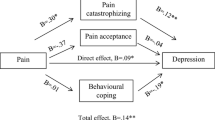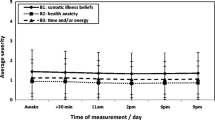Fibromyalgia syndrome (FMS) is a chronic musculoskeletal pain condition poorly understood in terms of etiology and treatment by both physicians and patients. This condition of “uncertainty of illness” was examined as a variable involved in the adjustment of FMS patients, relating it to their depression, anxiety, affect, and coping styles. Fifty-one community-residing FMS patients provided self-report information on subsets of adjustment variables. Both cross-sectional and more dynamic longitudinal analyses showed that illness uncertainty was significantly associated with anxiety, negative affect, and avoidant and passive coping. Its positive relationship with depression was eliminated when a control variable, pain helplessness, was included as a covariate. Longitudinally, illness uncertainty interacted with interpersonally stressful daily events in predicting reports of reduced positive affect, suggesting that illness uncertainty acts as a risk factor for affective disturbances during stressful times. Implications of these results for therapeutic interventions are discussed.
Similar content being viewed by others
Notes
The order of the partialling was chosen to test specifically the role of illness uncertainty, so pain helplessness was treated as a covariate. To examine the reverse possibility, the order was reversed, examining the partial correlations of pain helplessness controlling for illness uncertainty. In these analyses, one set for the affect variables and one set for the coping variables, there were no changes in the significance levels for pain helplessness with illness uncertainty partialled out. This suggests that, with the exception of the depression measure, the variables operated more or less independently of each other in their effects.
The Ns in these tables vary slightly due to occasional and unsystematic missing data when all variables are correlated with all other variables as in Table I.
REFERENCES
Berlyne, D. E. (1963). Motivational problems raised by exploratory and epistemic behavior. In Koch, S. (Ed.), Psychology: A Study of A Science, Vol. 5, McGraw-Hill, New York.
Boissevain, M. D., and McCain, G. A. (1991). Toward an integrated understanding of fibromyalgia syndrome. I. Medical and pathophysiological aspects. Pain 45: 227–238.
Bryk, A. S., and Raudenbush, S. W. (1992). Hierarchical Linear Models: Applications and Data Analysis Methods, Sage, Newbury Park, CA.
Burckhardt, C. S., and Bjelle, A. (1996). Perceived control: A comparison of women with fibromyalgia, rheumatoid arthritis, and systemic lupus erythematosus. Scand. J. Rheumatol. 25: 300–306.
Butler, R. A. (1958). Exploratory and related behavior: A new trend in animal research. J. Individ. Psychol. 14: 111–120.
Carver, C. S. (1997). You want to measure coping but your protocol's too long: Consider the brief COPE. Int. J. Behav. Med. 4: 92–100.
Davis, M. C., Zautra, A. J., and Reich, J. W. (2003). Vulnerability to stress among women in chronic pain from fibromyalgia and osteoarthritis. Ann. Behav. Med. 23: 215–226.
Fiske, D. W., and Maddi, S. R. (1961). Functions of Varied Experience, Dorsey, Homewood, IL.
Johnson, L., Zautra, A. J., and Davis, M. C. (in press). The role of illness uncertainty on coping with fibromyalgia symptoms. Health Psychol.
Littell, R. C., Milliken, G. A., Stroup, R. D., and Wolfinger, R. D. (1996). SAS System for Mixed Models, SAS Institute, Cary, NC.
Martin, M. Y., Bradley, L. A., Alexander, R. W., Alarcon, G. S., Triana-Alexander, M., Aaron, L. A., et al. (1996). Coping strategies predict disability in patients with primary fibromyalgia. Pain 68: 45–53.
Mishel, M. (1981). The measurement of uncertainty in illness. Nurs. Res. 30: 258–263.
Mishel, M. (1997). Uncertainty in Illness Manual, University of North Carolina School of a replication of the mediating effects of mastery and coping. Nurs. Res. 40: 236–240.
Mishel, M. H., and Sorenson, D. S. (1991). Uncertainty in gynecological cancer: A test of the mediating functions of mastery and coping. Nurs. Res. 40: 167–171.
Mishel, M. H., Hostetter, T., King, B., and Graham, V. (1984). Predictors of psychosocial adjustment in patients newly diagnosed with gynecological cancer. Cancer Nurs. 7: 291–299.
Montgomery, K. C. (1954). The role of the exploratory drive in learning. J. Comp. Physiol. Psychol. 47: 60–64.
Morley, S., and Wilkinson, L. (1995). The pain beliefs and perceptions inventory: A British replication. Pain 61: 427–433.
Nicassio, P. M., Schuman, C., Radojevic, V., and Weisman, M. H. (1999). Helplessness as a mediator of health status in fibromyalgia. Cog. Ther. Res. 23: 181–196.
Nicassio, P. M., Wallston, K. A., Callahan, L. F., Herbert, M., and Pincus, T. (1985). The measurement of helplessness in rheumatoid arthritis. The development of the arthritis helplessness index. J. Rheumatol. 12: 462–467.
Raymond, B., and Bergland, M. M. (1994). Psychosocial aspects of fibromyalgia syndrome. J. Appl. Rehab. Counsel. 25: 42–46.
Reich, J. W., Olmsted, M. E., and VanPuymbroeck, C. M. (2006). Illness uncertainty, partner caregiver burden and support and relationship satisfaction in fibromyalgia and osteoarthritis patients. Arthritis Care Res. 55: 86–93.
Reich, J. W., Zautra, A. J., and Davis, M. S. (2003). Dimensions of affect relationships: Models and their integrative implications. Rev. Gen. Psych. 7: 66–83.
Smith, T. W., Christensen, A. J., Peck, J. R., and Ward, J. R. (1994). Cognitive distortion, helplessness, and depressed mood in rheumatoid arthritis: A four-year longitudinal analysis. Health Psychol. 13: 213–217.
Smith, C. A., Wallston, K. A., Dwyer, K. A., and Dowdy, S. W. (1997). Beyond good and bad coping: A multidimensional examination of coping with pain in persons with rheumatoid arthritis. Ann. Behav. Med. 19: 11–21.
Suedfeld, P. (1980). Restricted Stimulation: Research and Clinical Application, Wiley, New York.
Veit, C. T., and Ware, J. E. (1983). The structure of psychological distress and well-being in general populations. J. Consult. Clin. Psychol. 51: 730–742.
Watson, D., and Clark, L. A. (1999). The PANAS-X manual for the positive and negative affect schedule–Expanded form. Retrieved September, 24, 2003 from the University of Iowa Web Site: http://www.psychology.uiowa.edu/Faculty/ Watson/PANAS-X.pdf.
Waylonis, G. W. (1992). Fibromyalgia and the workplace. Phys. Med. Rehabil.: State of the Art Rev. 6: 245–225.
Williams, D. A., and Thorn, B. E. (1989). An empirical assessment of pain beliefs. Pain 36: 351–358.
Wolfe, F., and Hawley, D. J. (1999). Evidence of disordered symptom appraisal in fibromyalgia: Increased rates of reported comorbidity and comorbidity severity. Clin. Exp. Rheumatol. 17: 297–303.
Wolfe, F., Smythe, H. A., Yunus, M. B., Bennett, R. M., Bombardier, C., Goldenberg, D. P., Tugwell, P., Campbell, S. M., Abeles, M., Clark, P., Fam, A. G., Farber, S. J., Fietchner, J., Franklin, C. M., Gatter, R. A., Hamaty, D., Lessard, J., Lichtbroun, A. S., Masi, A. T., McCain, G. A., Reynolds, W. J., Romano, T. J., Russell, I. J., and Sheon, R. P. (1990). Arthritis. Rheum. 33: 160–171.
Wong, C. A., and Bramwell, L. (1992). Uncertainty and anxiety after mastectomy for breast cancer. Cancer Nurs. 15: 363–371.
Zautra, A. J., Hamilton, N. A., and Burke, H. M. (1999). Comparison of stress responses in women with two types of chronic pain: Fibromyalgia and osteoarthritis. Cog. Ther. Res. 23: 209–230.
Zautra, A. J., and Smith, B. W. (2001). Depression and reactivity to stress in older women with rheumatoid arthritis and osteoarthritis. Psychosom. Med. 63: 687–696.
ACKNOWLEDGMENT
This study was supported by a grant from the Arthritis Foundation. The support of the foundation is gratefully acknowledged.
Author information
Authors and Affiliations
Corresponding author
Rights and permissions
About this article
Cite this article
Reich, J.W., Johnson, L.M., Zautra, A.J. et al. Uncertainty of Illness Relationships with Mental Health and Coping Processes in Fibromyalgia Patients. J Behav Med 29, 307–316 (2006). https://doi.org/10.1007/s10865-006-9054-7
Accepted:
Published:
Issue Date:
DOI: https://doi.org/10.1007/s10865-006-9054-7




